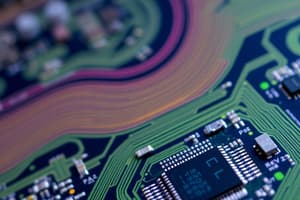Podcast
Questions and Answers
Which one of these best describes an operating system (OS)?
Which one of these best describes an operating system (OS)?
- A software that manages memory and provides an interface between hardware and software. (correct)
- A software that manages memory and provides an interface between hardware and users.
- A hardware component that manages memory and provides an interface between software and users.
- A hardware component that manages memory and provides an interface between software and hardware.
What is the main difference between firmware and an operating system (OS)?
What is the main difference between firmware and an operating system (OS)?
- Firmware manages memory and provides an interface, while an OS only provides an interface.
- Firmware abstracts the hardware, while an OS does not.
- Firmware is a software, while an OS is a hardware component.
- Firmware is developed specifically for a hardware, while an OS is developed for multiple hardware. (correct)
What is the role of an operating system (OS)?
What is the role of an operating system (OS)?
- To manage memory, provide an interface between programmers/users and hardware, and execute application programs.
- To manage memory, provide an interface between programmers/users and hardware, and act as an intermediary between programmers/users and hardware.
- To manage memory, provide an abstraction of the hardware, and execute application programs.
- To manage memory, provide an abstraction of the hardware, and act as an intermediary between programmers/users and hardware. (correct)
What is fragmentation in the context of memory management?
What is fragmentation in the context of memory management?
How does fragmentation affect storage?
How does fragmentation affect storage?
Which of the following is a benefit of learning about OS basics?
Which of the following is a benefit of learning about OS basics?
What is the relationship between hardware, OS, application programs, and users?
What is the relationship between hardware, OS, application programs, and users?
What is the main function of an operating system (OS)?
What is the main function of an operating system (OS)?
What is the kernel in an operating system (OS)?
What is the kernel in an operating system (OS)?
Which of the following is not a role of an operating system (OS)?
Which of the following is not a role of an operating system (OS)?
Study Notes
Operating System (OS) Basics
- An Operating System (OS) is a set of software that manages computer hardware resources and provides common services to computer programs.
Firmware vs Operating System (OS)
- The main difference between firmware and an operating system (OS) is that firmware is a type of software that is permanently stored in the read-only memory (ROM) of a hardware device, whereas an OS is a set of software that manages computer hardware resources.
Role of an Operating System (OS)
- The role of an operating system (OS) is to manage computer hardware resources, provide common services to computer programs, and act as an intermediary between computer hardware and user-level applications.
Fragmentation in Memory Management
- Fragmentation in the context of memory management refers to the phenomenon where free memory is broken into small, non-contiguous blocks, making it difficult to allocate memory for large requests.
Effects of Fragmentation on Storage
- Fragmentation can lead to reduced storage capacity, slower storage access, and increased storage fragmentation, making it essential to implement memory management techniques to mitigate these effects.
Benefits of Learning OS Basics
- Learning about OS basics can help individuals develop problem-solving skills, understand how computers work, and make informed decisions when choosing computer hardware and software.
Hardware, OS, Application Programs, and Users
- The relationship between hardware, OS, application programs, and users is that the OS acts as an intermediary between the hardware and application programs, providing an environment for the programs to interact with the hardware and users.
Main Function of an Operating System (OS)
- The main function of an operating system (OS) is to manage computer hardware resources, allocate system resources, and provide common services to computer programs.
Kernel in an Operating System (OS)
- The kernel is the central part of an operating system (OS) that manages hardware resources, provides services to application programs, and acts as a bridge between hardware and software.
Role of an Operating System (OS) Exception
- An operating system (OS) is not responsible for writing application programs or providing content for user interfaces.
Studying That Suits You
Use AI to generate personalized quizzes and flashcards to suit your learning preferences.
Description
Test your knowledge on operating systems and firmware with this quiz. Learn about the role of an operating system in managing hardware and software, and discover the characteristics of firmware designed for specific hardware.




